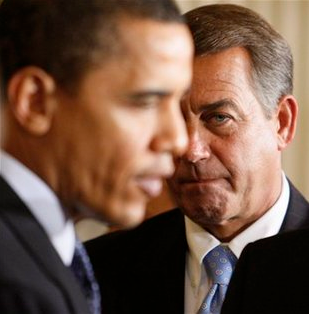Boehner Heads to WH for Talks
President Barack Obama has summoned the top Republican in Congress to the White House on Tuesday for talks aimed at averting a government shutdown this weekend.
Negotiations have stalled on legislation blending immediate spending cuts with the money required to run federal agencies through the end of September. Democrats are accusing the GOP of pressing harmful spending cuts and attaching a social policy agenda to the must-pass spending bill. House Speaker John Boehner counters that the White House is pressing gimmicky budget cuts.
On a separate long-term track, Republicans controlling the House have fashioned plans to slash the budget deficit by more than $5 trillion over the upcoming decade, combining unprecedented spending cuts with a fundamental restructuring of taxpayer-financed health care for the elderly and the poor.
House Budget Committee Chairman Paul Ryan, R-Wis., will unveil the GOP budget blueprint Tuesday morning just as Boehner, R-Ohio, heads to the White House for a meeting on the current-year measure with Obama, Vice President Joe Biden and Senate Majority Leader Harry Reid of Nevada, his chief nemesis in Congress.
In an op-ed in Tuesday's editions of The Wall Street Journal, Ryan estimated the proposed Republican budget cut at $6.2 trillion over 10 years. And he said later in a nationally broadcast interview that lawmakers must find a way to come to grips with the financially ailing Medicaid and Medicare programs, which Ryan called "the drivers" of the federal debt.
While Ryan said that over the coming decade, his budget would slash $6.2 trillion from Obama's spending proposals, the savings as measured against the Congressional Budget Office "baseline" would be less.
And if Ryan follows past practice, he'll adopt Obama's assumption that overseas military operations will soon cost just $50 billion a year rather than current levels that are roughly three times that amount. Some have challenged such an assumption as unrealistic.
Ryan's program also includes a controversial proposal to convert the traditional Medicare program for the aged into a system by which private insurers would operate plans approved by the federal government.
Current Medicare beneficiaries or workers age 55 and older would stay in the existing system.
At the same time, Republicans propose to sharply cut projected spending on the Medicaid state-federal health program for the poor and disabled and transform it into a block grant program that gives governors far less money than under current estimates, but considerably more flexibility.
GOP officials requiring anonymity to discuss the budget before its release Tuesday said more than $1 trillion in savings would come from Medicaid.


